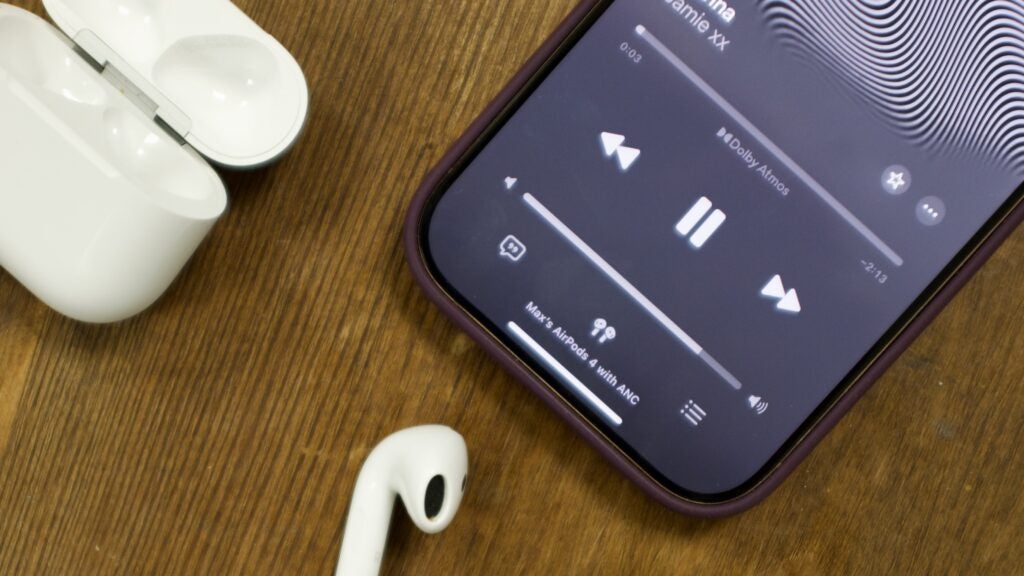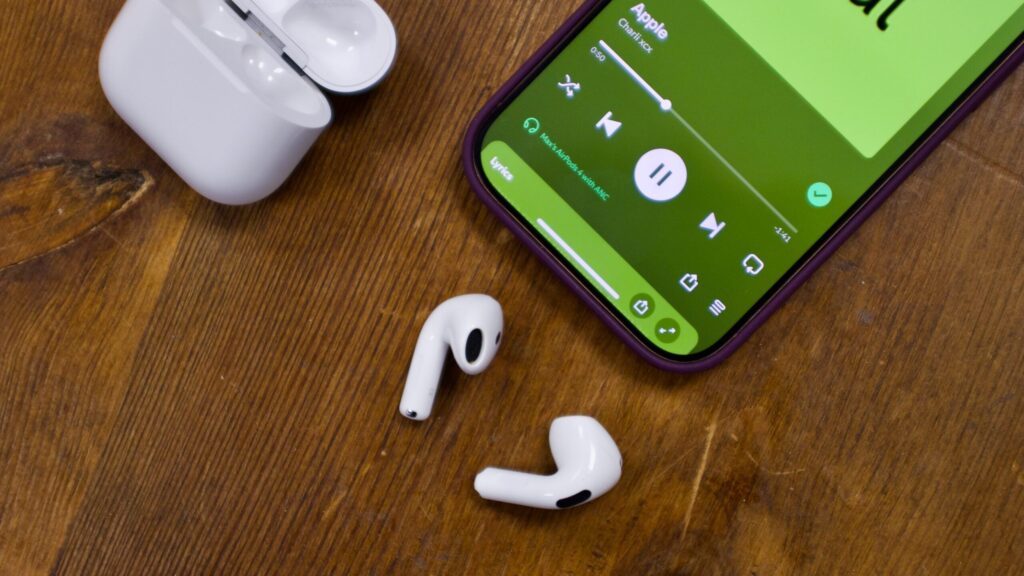Verdict
I am a huge fan of the AirPods 4 with ANC. If you’ve struggled with the in-ear design of the Pro model, these offer many of the same features in a less intrusive design.
The case is ridiculously tiny, and the battery life is good. You get all the usual AirPods features, like snappy pairing with multiple devices, plus useful new additions like USB-C.
Pros
- Great for those who you don’t like in-ear buds
- Packed with features
- Diminutive case
Cons
- The ANC has its limits
- Fit won’t be for everyone
-
H2 ChipUpdated chip, plus support for ANC -
Updated caseThe dinky case now has a speaker and USB-C
Introduction
Apple’s latest round of AirPod updates are here, and there are now two versions to choose from – AirPods 4 and AirPods 4 with ANC.
It’s the latter I have been testing for over two weeks, putting the new ANC features to the test over land, sea and air to see whether or not these are the best AirPods, or whether you might as well just pay more and go all out for the AirPods Pro 2.
While the naming is a little clunky, you could almost think of these as an AirPods Pro Light – or an AirPods 4 Plus.
They not only have active noise cancellation, something the standard AirPods 4 don’t, but a smarter case and more charging options too. For an extra £50 / $50, the choice seems obvious.
Design
- Very small case
- Improvements in comfort
- One size might not fit all
Like previous iterations of the ‘standard’ AirPods, the AirPods 4 with ANC don’t bury into your ear canal like the Pro model, instead resting just inside the ear.
While many are ok with the sensation of the Pros in-ear design, I know just as many people who simply can’t deal with it. This style of earbud is far less intrusive and will be an easy recommendation to many as a result – especially as it packs ANC, too.
The AirPods 4 follow much of the same design direction as the previous version, although the case is smaller and lighter (34g as opposed to 37g) and a little more pocketable. The shape of the buds is slightly different too, and I think they’re more comfortable on the whole.
Each bud has a sensor – Apple calls it a Force Sensor – which can be pressed to pause music, or held down to switch ANC modes. Unlike the AirPods Pro, you can’t swipe down on the bud to change volume.

Being plastic buds without any silicone tips does mean that if they don’t fit snugly into your ears there’s no way to alter the fit. It’s very much a one size should fit all. Luckily for me, they fit – I can shake my head and they stay in place; I can run without them falling out and so on. Not everyone will be so lucky.
The case has picked up a few new features from the AirPods Pro, including a speaker for audio alerts from Find My and a USB-C port (rather than Lightning) for charging. There’s no lanyard loop though, and you need to choose the specific ANC-toting version to get the speaker – the regular AirPods 4 lack this.


Features
- ANC with Transparency mode
- Spatial Audio
- Quick pairing
ANC, or active noise cancellation, is the big addition here and this is the first time Apple has added this feature to any buds but the AirPods Pro. it’s a welcome addition, even if its performance isn’t a complete success.
Typically, you’ll find ANC on earbuds that bury into your ear canal – like the AirPods Pro – rather than ones that rest in the ear like this. We have reviewed a couple of similar products, the Huawei FreeBuds 5 springs to mind, but the ANC performance has typically been so poor it’s barely worth having.
It’s a different story here. If you really can’t deal with that feeling of earbuds going down your ear canal then this version of the AirPods 4 is the best option. I’ve worn these buds on three plane trips, multiple London Underground rides, a Eurostar journey to Belgium and in a busy office and in each instance the benefit of ANC has been clear.
I’ll make it clear that the AirPods Pro still have superior ANC. The AirPods 4 with ANC tend to subdue sound, rather than completely removing it. It works very well at removing annoying office chatter and some of the rattles of a train, but it struggles with the roar of a plane engine.


On the London Underground, you can still hear the high-frequency noises, but some of the smaller rattles are removed. It’s the same when walking down a busy road: loud sounds from machinery still come through; a car going past is stifled.
Still, it does help in instances where the previous AirPods would have been almost useless. I could never wear AirPods on a flight, for example, whereas now I could. It’s those little instances where even though the ANC doesn’t block out everything, it blocks out enough.
While you can’t directly control the strength of the ANC – an Adaptive option does this automatically – you can enable a Transparency mode that allows noise through in instances where you need to hear something. Apple has developed a very good Transparency mode across all of its audio products and again it works very well here. Voices come through naturally without any robotic tones and it is easy to enable just by holding down the bud.
There is a mode called Conversation Awareness, which supposedly lets the Transparency mode kick it automatically when a voice is heard, but I have not had much luck here with it too often recognising coughs and sneezes as voices. In the end, I just turned it off.


AirPods can connect via Bluetooth to any device, although many of the best features are reserved for Apple’s own ecosystem devices. Spatial Audio, for example, requires Apple Music and a supported iPhone, iPad or Mac, while there’s no way to tweak any of the settings if you’re on Android.
Audio from one set of AirPods can be shared with another, so two people can watch the same film on an iPad. This is a neat touch, and it works well. Pairing AirPods with an iPhone is also very easy, and once they’re connected to a device associated with your Apple ID, they appear everywhere.
Battery life is good, although not the very best on the market. Apple claims the buds can last for four hours with ANC on and five with it off and in my tests, these results look to be true. I’d even go as far as saying if you keep the volume lower, the ANC numbers are closer to five hours. You’ll then get between a further four or five charges with the case, depending on your settings.
Apple has switched to USB-C, ditching the Lightning port from another product. This is good for those use using newer iPhones, although it’ll mean two cables for those using older hardware. Wireless charging remains and you can charge these with an Apple Watch charger too, which is a nice touch.
Sound Quality
- Bluetooth 5.3
- Powered by the H2 chip
- Sound can leak
The AirPod range has never been a home run for audio quality, instead offering a fairly run-of-the-mill sound that adapts well to all genres. These are earbuds for the masses, not for those who will forego extra functionality for a 100% focus on sound.
With that being said, these are the best sounding AirPods yet and aren’t too far off the AirPods Pro 2.
The good thing is that whether you’re listening to bass-heavy club tunes from Charli XCX or more vocal-focussed songs from London Grammar, the AirPods 4 do a good job.


There’s a bright energy to the busy beats in Charli XCX’s Guess, with the vocals managing to avoid being lost in the heavy backing track. This is a very bassy song too, and these buds do a good job of relaying that.
Something more downbeat, with distinct instruments and softer vocals, like Fontaines DC’s In The Modern World also sounds good, with a nice amount of atmosphere created and a wide soundstage. There could be a little more clarity, and you do get this on the AirPods Pro, but it’s an improvement over the AirPods 3.
I’ve also struggled to be blown away by Atmos mixes of songs playing in Spatial Audio from Apple Music. There’s limited immersion here compared to the larger AirPods and you need to be listening to a really good mix to hear anything different. Jamie XX’s In Waves sounds virtually the same in Atmos or without, as does Supersonic from Oasis.


The open nature of the buds does mean that I have found audio is best when you’re listening in a quiet room, or with the ANC on. In louder environments, too many intrusive noises can dampen things down. I noticed this a lot with podcasts and audiobooks, where I’d need to jack the volume up high. Sound also tends to leak out, which can annoy people next to you. You don’t get this as much with in-ear buds.
Latest deals
Should you buy it?
You really dislike intrusive in-ear buds
The open feel of these earbuds will be a great benefit to many, especially as they now have the benefits of ANC too.
You want ANC to impress on planes
The ANC here is welcome, and in many situations, it works. In tougher scenarios though, like on a flight, you’ll do better with the AirPods Pro 2 – or the AirPods Max.
Final Thoughts
For many, the AirPods Pro 2 are the best AirPods – especially as they often drop down in price to around the same as the AirPods 4 with ANC. Apple’s higher-end buds sound better, don’t leak audio and have stronger ANC thanks to their in-ear design.
But, and this is important, if you don’t like the sensation of earbuds burying down your ear canal and want a less intrusive offering, I can’t recommend the AirPods 4 enough. They have the best ANC for this style of earbud around, and pick up a number of quality-of-life updates too – like Find My support, USB-C and tweaked design that’s both smaller overall and more comfortable.
Sound quality isn’t exactly audiophile-friendly and some of the subtler aspects of music are lost. They still sound good though, and the ANC allows the music to stay in your ear a little better than before. You’ll find better-sounding buds at this price if that is your main concern.
There’s a £50 / $50 difference in price between the AirPods 4 and the ANC model – for me, pay the extra price as it’s worth it. Not only does the ANC make these buds easier to wear in various loud environments, but you also get wireless charging and Find My support inside the case.
How we test
We test all the headphones we review thoroughly over an extended period of time. We use industry standard tests to compare features properly. We’ll always tell you what we find. We never, ever, accept money to review a product.
Find out more about how we test in our ethics policy.
Tested across several weeks
Tested with real world use
FAQs
No, you need to provide your own cable here. If you’ve got an iPhone 16 or 15, you can use that cable here. There’s also Qi wireless charging, MagSafe and you can charge via the Apple Watch charger too.
UK RRP
USA RRP
EU RRP
CA RRP
AUD RRP
Manufacturer
IP rating
Wireless charging
Fast Charging
Weight
ASIN
Release Date
First Reviewed Date
Noise Cancellation?
Connectivity
Colours
Frequency Range
Headphone Type
Voice Assistant
›


